Charles E W Bean, Diaries, AWM38 3DRL 606/45/1 - June 1916 - Part 5
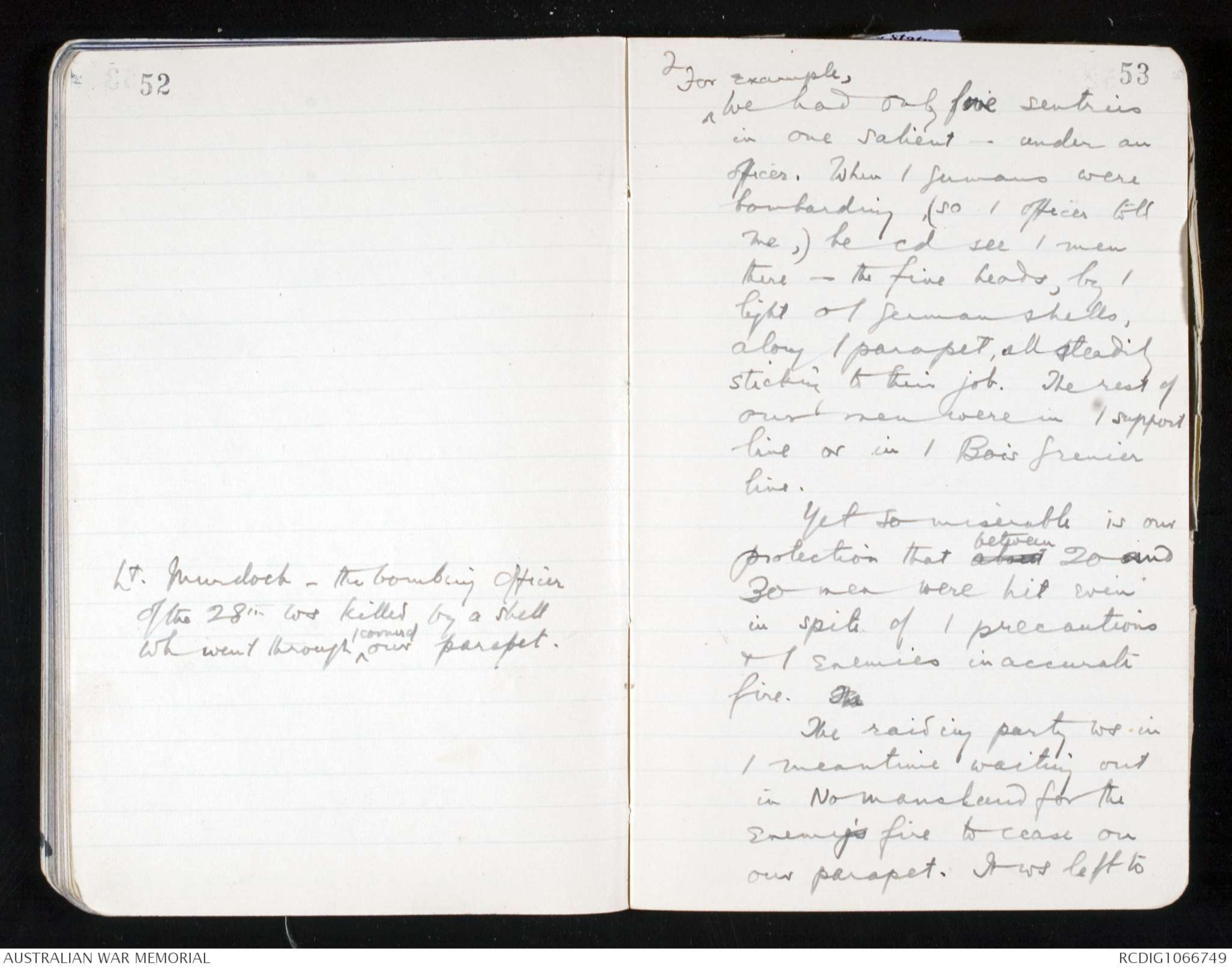
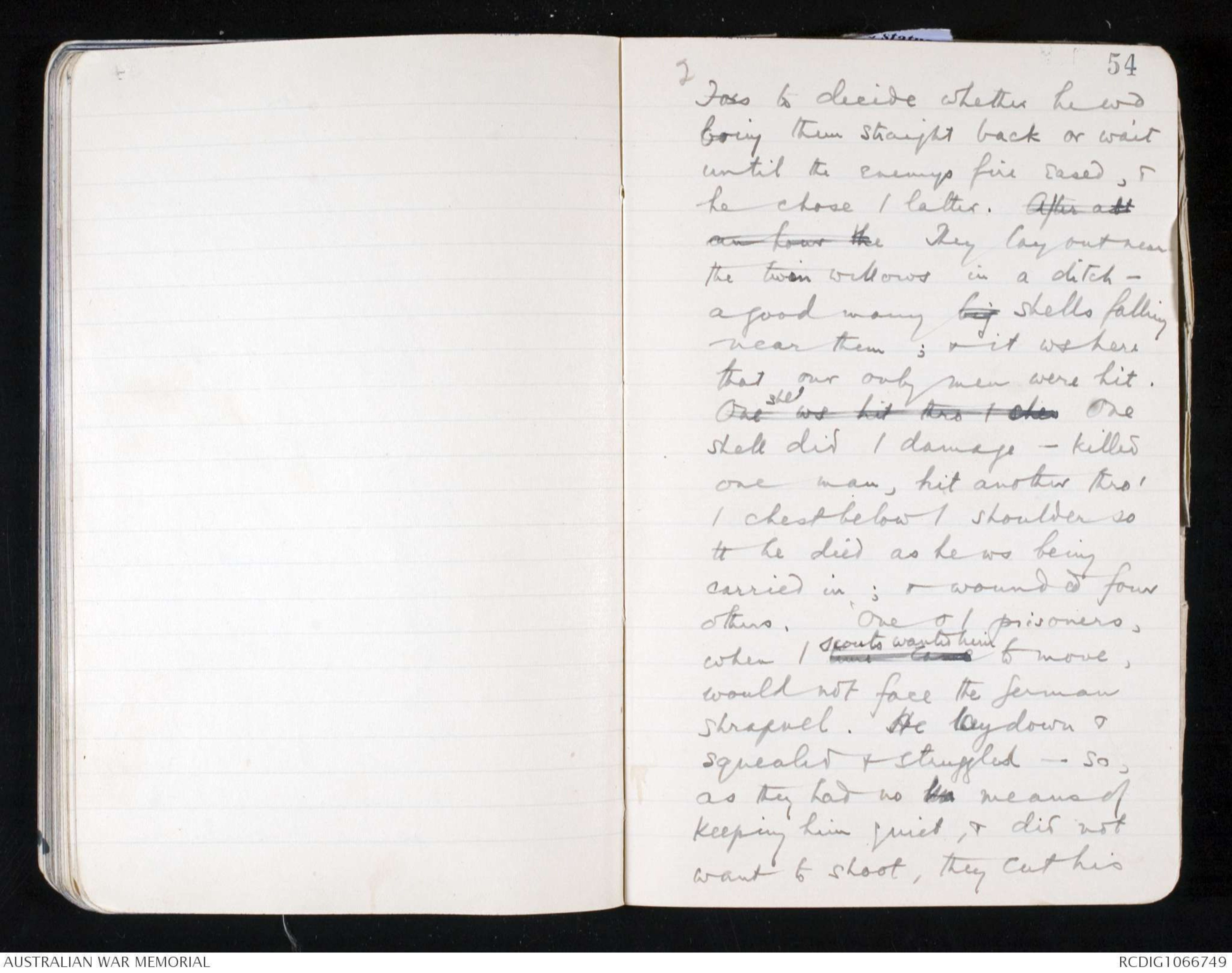
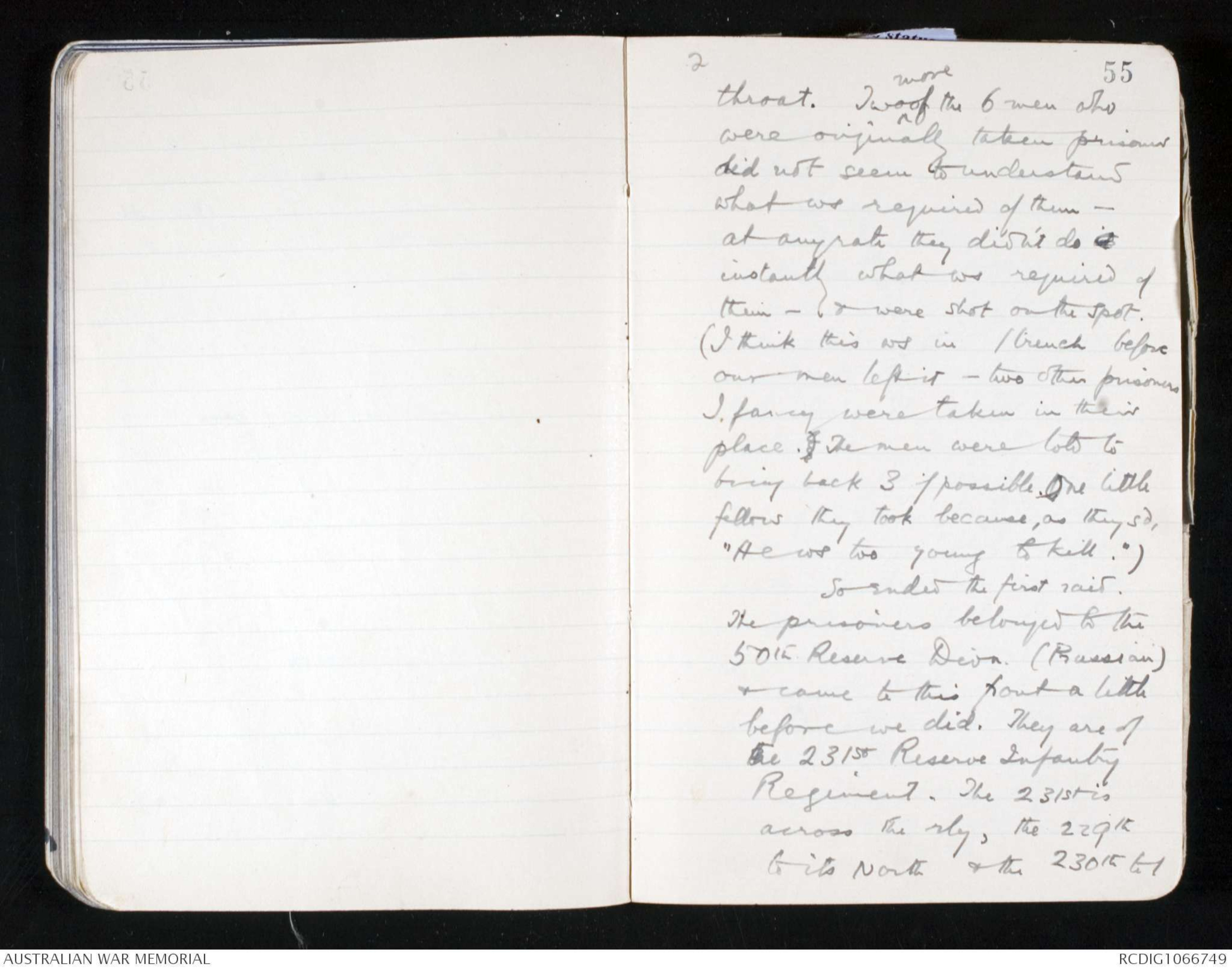
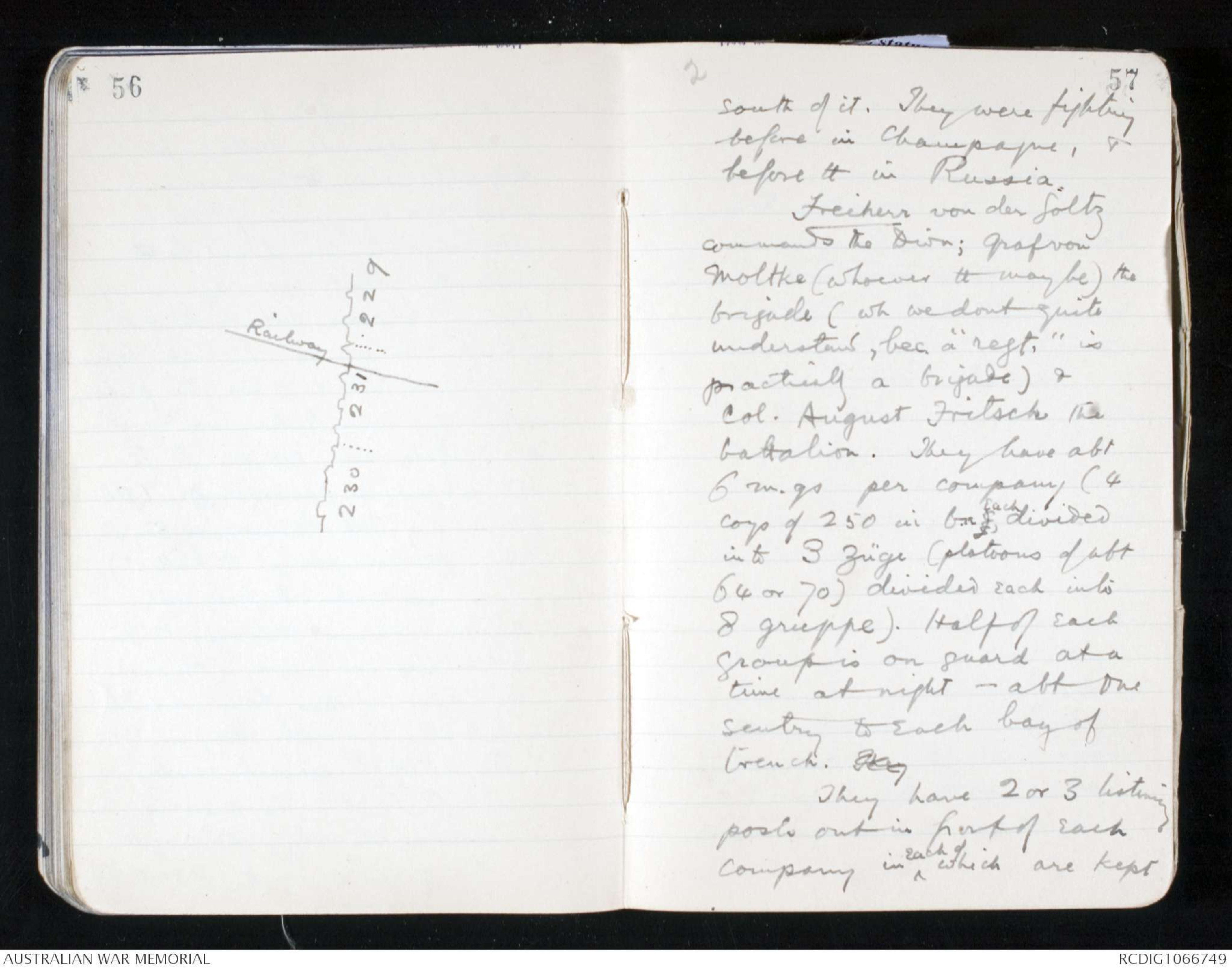
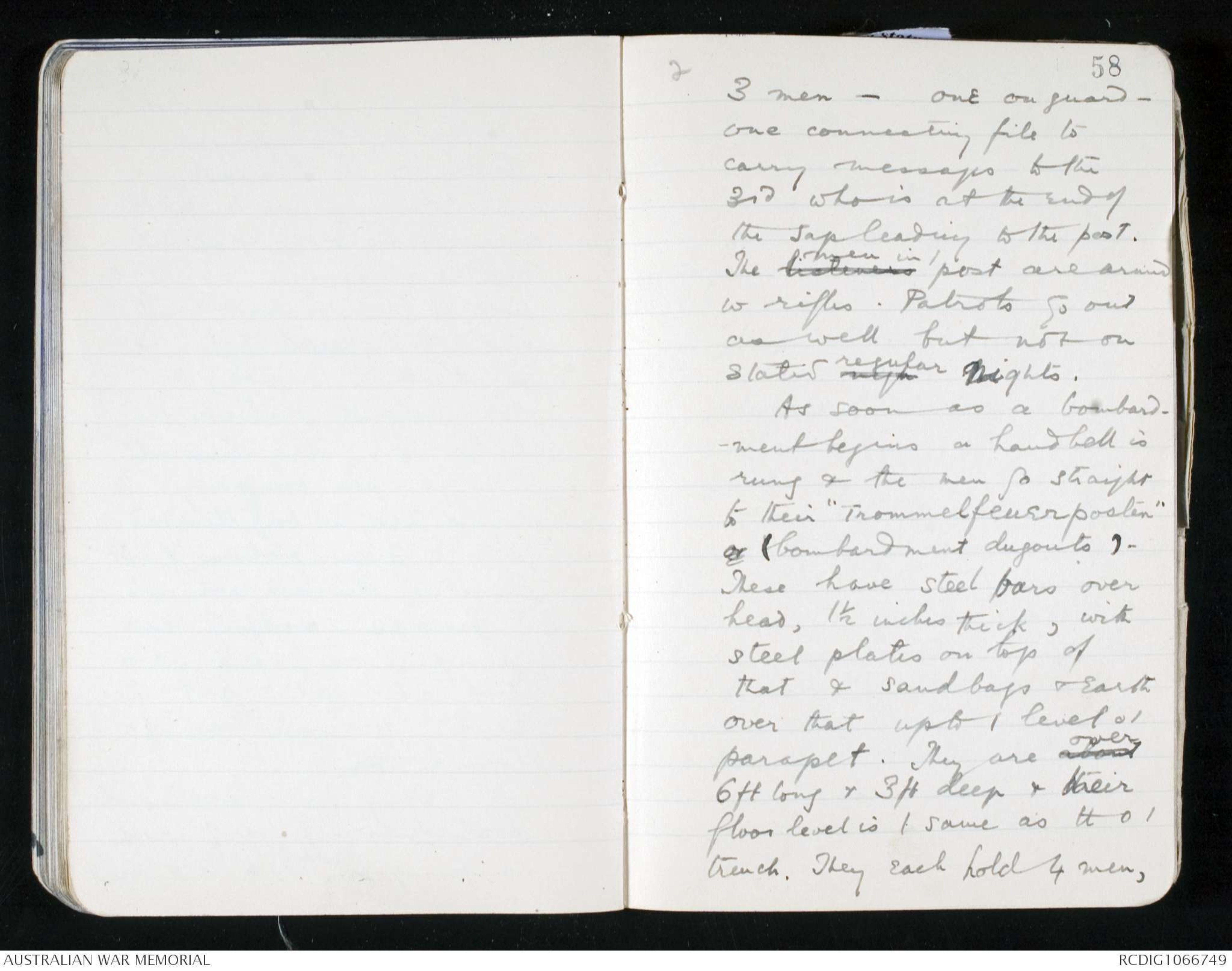
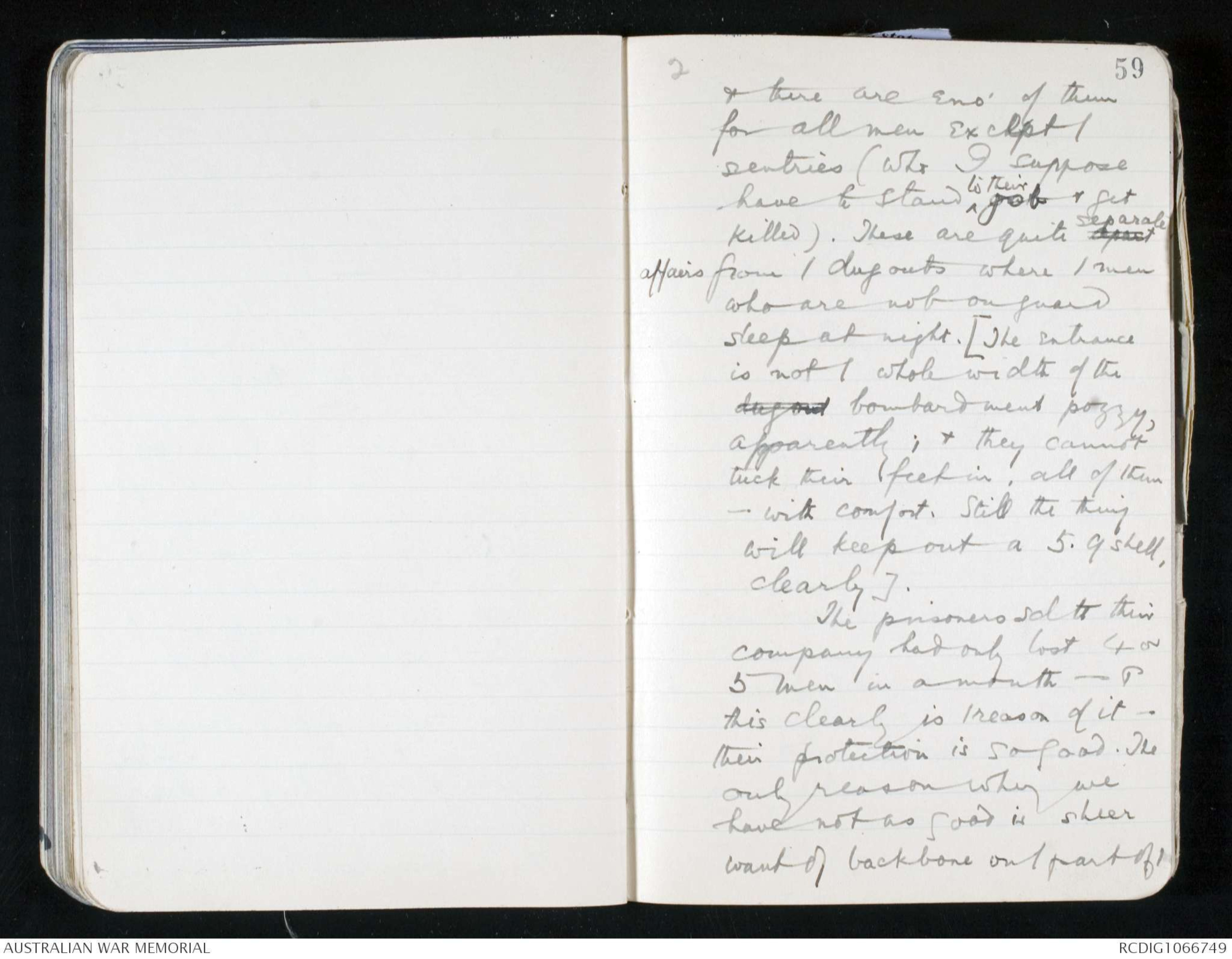
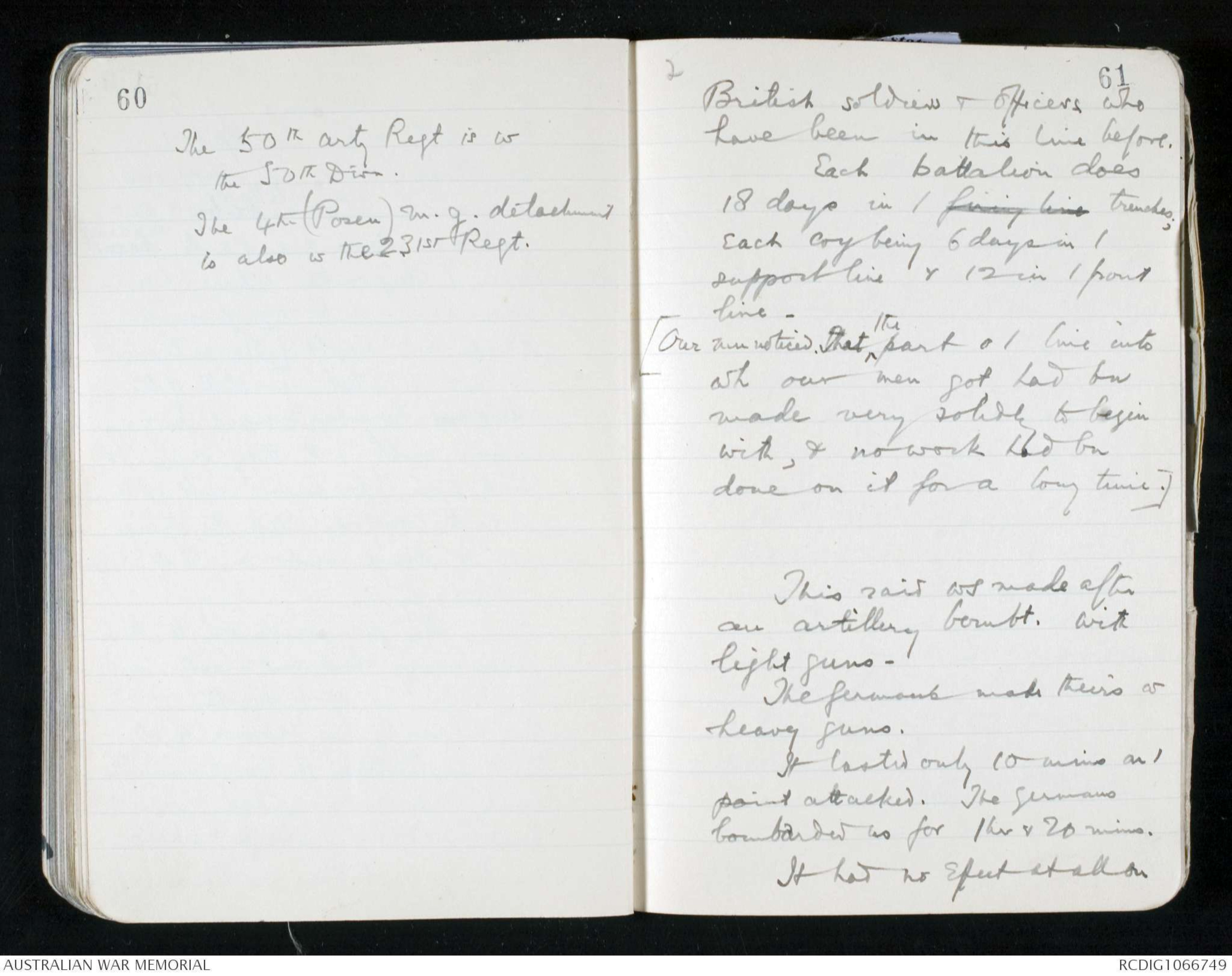
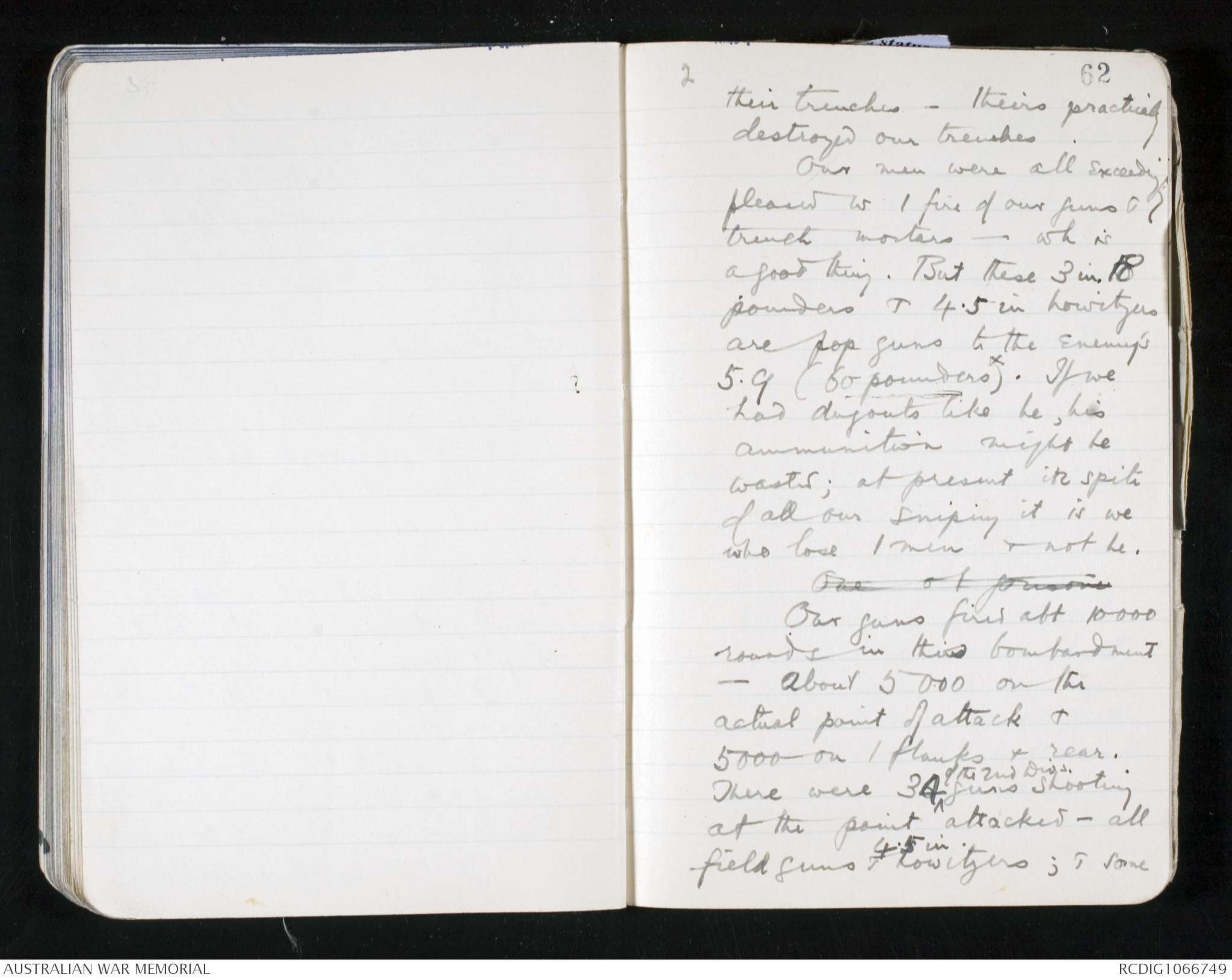
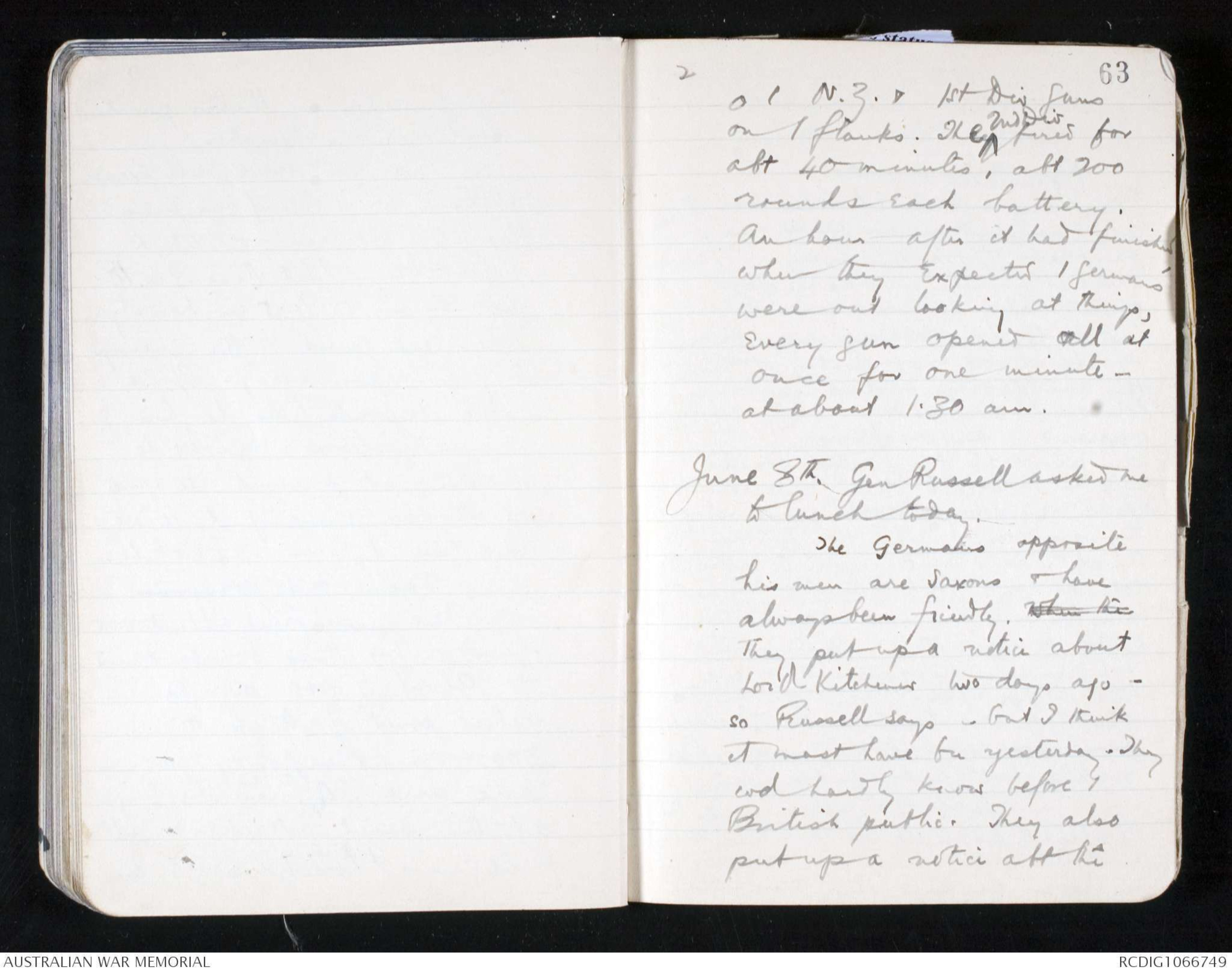
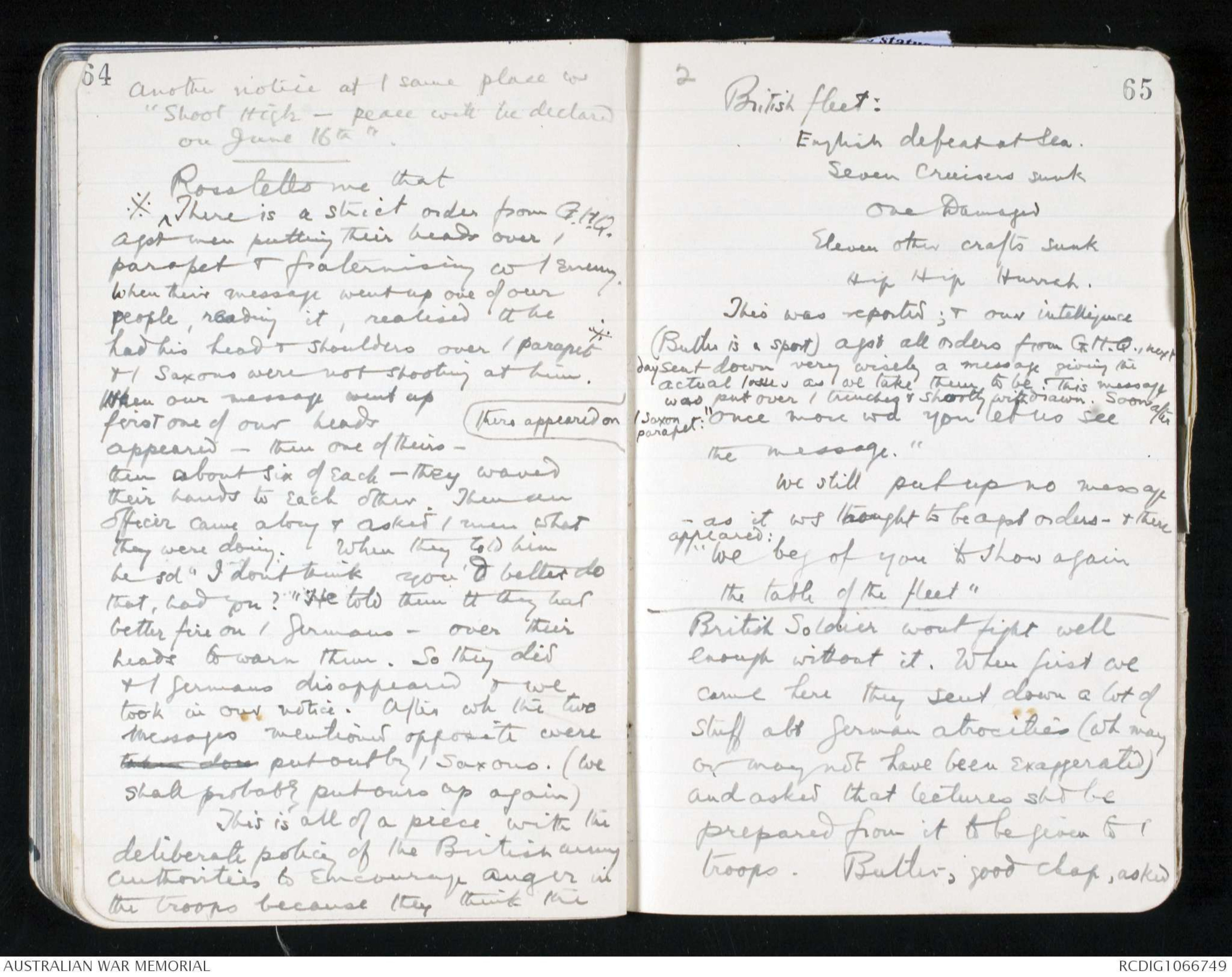
52
Lt. Murdock - the bombing officer
of the 28th ws killed by a shell
wh went through / ^corner of our parapet.
2 53
∧For example, We had only five sentries
in one salient- under an
officer. When / Germans were
bombarding, (so / officer told
me,) he cd see / men
there - the five heads, by /
light o / German shells,
along / parapet, all steadily
sticking to their job. The rest of
our men were in / support
line or in / Bois Grenier
line.
Yet so miserable is our
protection that about between 20 and
30 men were hit even
in spite of / precautions
& / enemies inaccurate
fire. The
The raiding party ws in
/ meantime waiting out
in Nomansland for the
enemy's fire to cease on
our parapet. It ws left to
2 54
Foss to decide whether he wd
bring them straight back or wait
until the enemys fire eased, &
he chose / latter. After abt an hour the They lay out near
the twin willows in a ditch -
a good many big shells falling
near them; & it ws here
that our only men were hit.One ws hit thro / ches One
shell did / damage - killed
one man, hit another thro'
/ chest below / shoulder so
tt he died as he ws being
carried in; & wounded four
others. One o / prisoners,
when / time came scouts wanted him to move,
would not face the German
shrapnel. He lay down &
squealed & struggled - so,
as they had no xxx means of
keeping him quiet, & did not
want to shoot, they cut his
2 55
throat. Two ^more of the 6 men who
were originally taken prisoner
did not seem to understand
what we required of them -
at any rate they didn't do it
instantly what ws required of
them - & were shot on the spot.
(I think this ws in / trench before
our men left it - two other prisoners
I fancy were taken in their
place. ) The men were told to
bring back 3 if possible. One little
fellow they took because, as they sd,
"He ws too young to kill.")
So ended the first raid.
The prisoners belonged to the
50th Reserve Divn. (Prussian)
& came to this front a little
before we did. They are of
the 231st Reserve Infantry
Regiment. The 231st is
across the rly, the 229th
to its North & the 230th to /
56
'Diagram - see original document'
2 57
South of it. They were fighting
before in Champagne, &
before tt in Russia.
Freiherr von der Goltz
commands the Divn; Graf von
Moltke (whoever tt may be) the
brigade (wh we dont quite
understand, bec a "regt," is
practically a brigade) &
Col. August Fritsch the
battalion. They have abt
6 m.gs per company (4
coys of 250 in b.n), each divided
into 3 Zűge (platoons of abt
64 or 70) divided each into
8 gruppe). Half of each
group is on guard at a
time at night - abt one
sentry to each bay of
trench. They
They have 2 or 3 listening
posts out in front of each
company in ^each of which are kept
2 58
3 men - one on guard -
one connecting file to
carry messages to the
3rd who is at the end of
the sap leading to the post.
The listeners men in / post are armed
w rifles. Patrols go out
as well but not on
stated night regular nights.
As soon as a bombardment
begins a hand bell is
rung & the men go straight
to their "Trommel feuer posten"or (bombardment dugouts).
These have steel bars over
head, 1½ inches thick, with
steel plates on top of
that & sandbags & earth
over that up to / level o /
parapet. They are about over
6ft long & 3ft deep & their
floor level is / same as tt o /
trench. They each hold 4 men,
2 59
& there are eno' of them
for all men except /
sentries (who I suppose
have to stand ^to their job & get
killed). These are quite apart separate
affairs from / dugouts where / men
who are not on guard
sleep at night. [The entrance
is not / whole width of the dugout bombardment pozzy,
apparently; & they cannot
tuck their feet in, all of them
- with comfort. Still the thing
will keep out a 5.9 shell,
clearly].
The prisoners sd tt their
company had only lost 4 or
5 men in a month - &
this clearly is / reason of it -
their protection is so good. The
only reason why we
have not as good is sheer
want of backbone on / part of /
60
The 50th arty Regt is w
the 50th Divn.
The 4th (Posen) m.g. detachment
is also w the 231st Regt.
2 61
British soldiers & officers who
have been in this line before.
Each battalion does
18 days in / firing line trenches;
Each coy being 6 days in /
support line & 12 in / front
line.
[Our men noticed that ^the part o / line into
wh our men got had bn
made very solidly to begin
with, & no work had bn
done on it for a long time.]
This raid ws made after
an artillery bombt. with
light guns -
The Germans make theirs w
heavy guns.
It lasted only 10 mins on /
point attacked. The Germans
bombarded us for 1 hr & 20 mins.
It had no effect at all on
2 62
their trenches - theirs practically
destroyed our trenches.
Our men were all exceedingly
pleased w / fire of our guns &
trench mortars - wh is
a good thing. But these 3in. 18
pounders & 4.5 in howitzers
are pop guns to the enemy's
5.9 (60 pounders)x. If we
had dugouts like he, his
ammunition might be
wasted; at present in spite
of all our sniping it is we
who lose / men & not he.One o / prisioner
Our guns fired abt 10000
rounds in this bombardment
- about 5000 on the
actual point of attack &
5000 on / flanks & rear.
There were 34 ^of the 2nd Divs guns shooting
at the point attacked - all
field guns, & 4.5in howitzers; & some
2 63
o / N. Z. & 1st Div guns
on / flanks. The ^2nd Div fired for
abt 40 minutes, abt 200
rounds each battery.
An hour after it had finished,
when they expected / Germans
were out looking at things,
every gun opened all at
once for one minute -
at about 1.30 am.
June 8th Gen Russell asked me
to lunch today.
The Germans opposite
his men are Saxons & have
always been friendly. When the
They put up a notice about
Lord Kitchener two days ago -
so Russell says - but I think
it must have bn yesterday. They
wd hardly know before /
British public. They also
put up a notice abt the
64
Another notice at / same place ws
"Shoot High - peace will be declared
on June 16th ".
————
.X. ^Ross tells me that There is a strict order from G.H.Q.
agst men putting their heads over /
parapet & fraternising w / enemy.
When their message went up one of our
people, reading it, realised tt he
had his head & shoulders over / parapet .X.
& / Saxons were not shooting at him.
When our message went up
first one of our heads
appeared - then one of theirs -
then about six of each - they waved
their hands to each other. Then an
officer came along & asked / men what
they were doing. When they told him
he sd "I dont think you'd better do
that had you ?" He told them tt they had
better fire on / Germans - over their
heads to warn them. So they did
& / Germans disappeared & we
took in our notice. After wh the two
messages mentioned opposite weretaken down put out by / Saxons. (We
shall probably put ours up again)
This is all of a piece with the
deliberate policy of the British army
authorities to encourage anger in
the troops because they think the
2 65
British fleet:
English defeat at Sea.
Seven Cruisers sunk
One Damaged
Eleven other crafts sunk
Hip Hip Hurrah.
This was reported; & our intelligence
(Butler is a sport) agst all orders from G.H.Q., next
day sent down very wisely a message giving the
actual losses as we take them to be. This message
was put over / trenches & shortly withdrawn. Soon after
there appeared on / Saxon parapet: "Once more wd you let us see
the message."
We still put up no message
- as it ws thought to be agst orders - & there
appeared:
"We beg of you to show again
the table of the fleet"
———————————
British Soldier wont fight well
enough without it. When first we
came here they sent down a lot of
stuff abt German atrocities (wh may
or may not have been exaggerated)
and asked that lectures shd be
prepared from it to be given to /
troops. Butler, good chap, asked
 Transcriber 6897
Transcriber 6897This transcription item is now locked to you for editing. To release the lock either Save your changes or Cancel.
This lock will be automatically released after 60 minutes of inactivity.